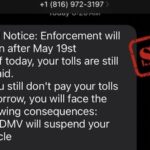
The DMV Unpaid Ticket Scam
June 20, 2025
Who’s Driving That Truck?
July 24, 2025
Keep it down, hey?
Yes, idling regulations here. And we’re not talking about HR’s rules for standing around the water cooler. States and counties and cities have laws covering how long drivers can keep their engines running before being subject to tickets and fines. For example:
California has a maximum idling time of 5 minutes. The minimum first fine is $300, with subsequent penalties from $1,000 to $10,000. Of course, there are a number of exemptions, such as bad weather conditions; mechanical problems; emergency vehicles; and having a “California Certified Clean Idle” label.
Chicago has a maximum idling time of 3 minutes in any 60-minute period. The fine is $250. Exemption include traffic conditions; idle reduction technologies; exhaust filter regeneration; and power auxiliary equipment.
Nevada has a maximum idling time of 15 minutes. The fine is not less than $2,000. And, get this, the fine in Clark County, where Las Vegas resides, is not more than $10,000. So, gamble at your own risk.
Philadelphia’s maximum idling time is 2 minutes or 0 (zero) minutes for layovers, with variances of 5 minutes if it’s below 32 degrees and 20 minutes if it’s below than 20 degrees.
All firm yet fair and reasonably flexible.
Why the focus on idling? It’s a terrible culprit of air and noise pollution. Idling of personal vehicles alone puts some 30 million tons of carbon dioxide into the air every year, which translates to about six billion gallons of fuel. That all contributes to hazy conditions, particulate and chemicals and gases in the air, breathing problems, heart disease, and worsening of asthma. Plus all the economic toll of wasted fuel, which requires us to refill our gas tanks more often.
Utah’s Department of Environmental Quality has an interesting set of facts and debunked myths. Some highlights:
-
A car that’s idling gets zero mpg.
-
It’s good practice to turn off your engine when stopped for more than 10 seconds. “More than 10 seconds of idling can use more fuel than turning off the engine and restarting it. If you are stopped for more than 10 seconds, you’ll save fuel and money by turning off the vehicle and then restarting it when you’re ready to drive away.”
-
Studies show that restarting the engine many times has little impact on components such as the battery and the starter motor. Component wear caused by restarting the engine is estimated to add $10 per year to the cost of driving, money that will likely be recovered several times over in fuel savings from reduced idling.
So, can we turn off the engine for 60 seconds and restart the vehicle and, you know, get away with it? Maybe. Probably not. It all speaks to honoring the spirit of the law. A lot of cops were born at night…but not last night.
Idle quietly, eh?

